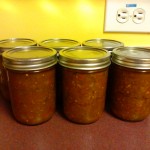From the self-proclaimed, non-domestic goddess… I’m the first to admit a few things about myself: I’m lazy, there’s not a domestic bone in my body, really hate cooking and anything to do with the kitchen (but I do love eating really yummy food), can’t stand a dirty kitchen (and the easiest way to keep it clean is to not get it dirty in the first place), hate gardening and anything to do with being outside and sweaty (didn’t I already admit to being lazy?), and I’m frugal (my sister calls it cheap).
So I grew up in the South, and of course we had a big garden. I always swore that when I grow up, I’m NEVER having a garden. Well, I also grew up eating tomato sandwiches and LOVE them. Unfortunately, grocery store tomatoes may as well be made of wax for all the flavor they have. That left me with learning (all over again) how to grow my own tomatoes.
I’m also one of those dirty, rotten, stinkin’, capitalists who really believes that our federal government is gonna be the cause of the demise of the USA. In preparation for the coming economic doom (or zombie apocalypse), I also pushed my husband into buying a home with a little bit of land, on which we’ve been growing tomatoes, and a few fruit & nut trees. This is logical not only for prepping purposes, but also to save money by growing our own.
Here we are, two years later, and I’m looking at more tomatoes and apples than I know what to do with, so am being FORCED into learning a new skill: canning. Ok… isn’t this why I pushed for a home with gardening space in the first place? Can’t start prepping without 1) a garden and 2) canning. In a few years, it’ll be blueberries (so far we’ve managed to eat them all – and there were LOTS this year), pears, plums, and figs, too!
My first dilemma came a few weeks ago when I was looking at a kitchen counter full of tomatoes and the realization that even I can’t eat that many tomatoes and tomato sandwiches! hahaha So I got out You Can Can (the canning book I purchased, promising my husband that I’d put it to work) and did some research online to find a recipe that was easy enough for me. (I don’t only hate cooking, but am totally lacking in that skill set – dear hubby says I don’t have the patience. Good thing he loves it and is really good at it!) Found an easy recipe, but when I went to the store to buy the ingredients… found a mix! Now THAT’S easier than mixing ingredients. The instructions were simple, too.
A few hours later, I was proudly looking at my 2.5 quarts of home-made, CANNED salsa! Unfortunately, the mix I got was supposed to yield 5 quarts. After tasting, I was glad it wasn’t 5, because it was pretty bland for salsa. As much salsa as we eat, this will save us some bucks, too!
Last week, when I realized the apples were beginning to fall off the trees, I looked up recipes for canning them. Didn’t really know if I wanted to do apple sauce, apple butter, or pie filling. Fortunately, apples are acidic enough that you can simply “blanch and bottle”… meaning they’re just apple slices, so you can use them however you wish whenever you decide. Put up 5 pints of those.
Also had 3 “chocolate cherry” tomato vines (which daughter talked me into buying) that were overflowing. This family of 3 can’t eat that many salads! Chopped them up and had 12 cups (the equivalent of 8 quarts or just over 3 pounds). After another 3 HOURS of research, I could not find a salsa recipe that fit – either exactly or by proportion.
WHY can’t someone write a recipe formula that says for every so many cups/lbs/qts of tomatoes, one can safely add this many chilies, this much onion, and this much cilantro, etc.?!?!?!?!?!?!?
Ya, see, the thing to worry about with canning is that if you want to use the simple “water bath” method, you have to use an acidic food or recipe. This is apparently because there’s a spore called botulism that will grow in your canned food and kill you. But high acid (pH of 4.6 or lower) OR high heat (if you use a pressure cooker) will kill it instead. Some tomatoes aren’t acidic enough (yeah, news to me, too), and apparently chilies and onions (my intended other ingredients) will lower the acid level farther. (Yeah, that sounds odd to me, too, but I’m not the expert scientist on acidic foods.) The research indicated that when canning (“plain old”) tomatoes, just add some lemon juice or citric acid to each jar while filling to ensure proper pH levels (lemon juice: 2 tbsp per quart or 1 tbsp per pint; citric acid: 1/2 tsp per quart or 1/4 tsp per pint).
Unfortunately, when I go to chop up the peppers that a friend had given us, they’d all spoiled. This meant yet another trip to the store. Oh, I forgot to add in the list above that I hate shopping, too. Well, at least this provided the opportunity to buy toilet paper and quart freezer bags – which I kept forgetting on earlier grocery shopping trips. (Don’t ya hate doing that?!?)
Loosely based on a simple recipe that I’d found (that didn’t fit the amount of tomatoes I had on hand), here’s what I did:
- 12 cups of tomatoes
- 1.5 white onions
- 3 7-oz cans of chillies
- 1/4 cup dried cilantro (approximately)
- 1 Tbsp lemon juice per quart jar
This yielded 7 pints of salsa. Ok… so how did adding chilies and onion to 8 quarts of tomatoes yield only 7 pints of salsa?!?!?!?!? Must be because when I put it all in the blender (yes, a blender… remember, I’m lazy!), they took up less space than they did in the bowl in which I measured them. One jar didn’t seal, so this morning it got poured into the opened jar in the fridge that we’re currently eating… from the last batch using the mix that turned out too bland for my taste. (Didn’t I say we eat a LOT of salsa?)
Hubby & I taste-tested while it was simmering and it was YUMMY! Unfortunately, it’s also so acidic that I got instant heart burn! Fortunately, in all this research, I learned that I can add baking soda to reduce the acid level after opening if it’s still to acidic.
I am really amazed to find that canning is so easy! Even the laziest, non-domestic goddess can do it! And if I don’t die of botulism poisoning in a few months, we’ll know that the recipe worked. Or… we’re just lucky!










